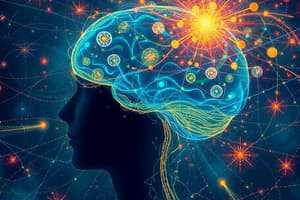Podcast
Questions and Answers
What is the primary focus of clinical psychology?
What is the primary focus of clinical psychology?
- Diagnosing and treating mental illness (correct)
- Studying the unconscious mind
- Investigating brain functions
- Analyzing workplace dynamics
Who is considered the founder of structuralism?
Who is considered the founder of structuralism?
- Sigmund Freud
- B.F. Skinner
- William James
- Wilhelm Wundt (correct)
Which branch of psychology focuses on the psychological growth and changes across a person's lifespan?
Which branch of psychology focuses on the psychological growth and changes across a person's lifespan?
- Developmental Psychology (correct)
- Biological Psychology
- Industrial-Organizational Psychology
- Clinical Psychology
What is the primary distinction between mind and behavior in psychology?
What is the primary distinction between mind and behavior in psychology?
Which of the following illustrates observational learning in behaviorism?
Which of the following illustrates observational learning in behaviorism?
What type of research method involves manipulating variables to assess cause-and-effect relationships?
What type of research method involves manipulating variables to assess cause-and-effect relationships?
Which decade is most associated with the rise of positive psychology?
Which decade is most associated with the rise of positive psychology?
What is the focus of biopsychology in understanding behavior?
What is the focus of biopsychology in understanding behavior?
Flashcards are hidden until you start studying
Study Notes
Definition of Psychology
- Psychology: The scientific study of behavior and mental processes.
Historical Background
- Ancient Philosophies: Roots in philosophy; philosophical inquiries by figures like Socrates, Plato, and Aristotle.
- Structuralism: Founded by Wilhelm Wundt; focused on the structure of consciousness.
- Functionalism: Founded by William James; emphasized the function and purpose of behavior.
- Psychoanalysis: Developed by Sigmund Freud; explored the unconscious mind and its influence on behavior.
- Behaviorism: Advocated by John B. Watson and B.F. Skinner; focused on observable behavior and environmental stimuli.
Key Concepts
- Mind vs. Behavior: Distinction between internal mental states and observable actions.
- Nature vs. Nurture: Debate regarding the influence of genetics (nature) or environment (nurture) on behavior.
- Psychopathology: Study of psychological disorders, their causes, and treatments.
Branches of Psychology
- Clinical Psychology: Focuses on diagnosing and treating mental illness.
- Developmental Psychology: Studies psychological growth and change across the lifespan.
- Cognitive Psychology: Investigates mental processes like perception, memory, and problem-solving.
- Social Psychology: Examines how individuals influence and are influenced by others.
- Biological Psychology: Explores the relationship between biology and behavior.
- Industrial-Organizational Psychology: Applies psychological principles to workplace environments.
Research Methods
- Experimental: Manipulating variables to determine cause-and-effect relationships.
- Correlational: Examining the relationship between two variables without manipulation.
- Case Studies: In-depth analyses of individual cases.
- Surveys: Collecting data from a large number of participants through questionnaires.
Applications of Psychology
- Mental Health: Treatment and management of psychological disorders.
- Education: Enhancing learning and teaching methods.
- Business: Improving workplace productivity and employee satisfaction.
- Forensic: Applying psychological principles in legal contexts.
Important Figures
- Wilhelm Wundt: Established the first psychology laboratory.
- Sigmund Freud: Introduced psychoanalysis and concepts like the unconscious and defense mechanisms.
- B.F. Skinner: Pioneered research in behaviorism and operant conditioning.
Current Trends
- Positive Psychology: Focuses on strengths and well-being rather than pathology.
- Neuropsychology: Combines neuroscience with psychology to understand brain-behavior relationships.
- Cultural Psychology: Examines how cultural contexts influence psychological processes and behaviors.
Definition of Psychology
- Psychology is the scientific study of behavior and mental processes.
Historical Background
- Early roots of psychology can be traced back to ancient philosophy with thinkers like Socrates, Plato, and Aristotle.
- Wilhelm Wundt founded structuralism, which focused on the basic elements of consciousness.
- William James established functionalism, emphasizing the practical functions of mental processes.
- Sigmund Freud developed psychoanalysis, exploring the unconscious mind and its influence on behavior.
- John B. Watson and B.F. Skinner championed behaviorism, emphasizing the role of observable behavior and environmental stimuli.
Key Concepts
- Psychology examines the relationship between mind and behavior: internal mental states and observable actions.
- The nature vs. nurture debate explores the relative influence of genetics and environment on behavior.
- Psychopathology is the study of psychological disorders, their causes, and treatments.
Branches of Psychology
- Clinical Psychology: Diagnosis and treatment of mental illness.
- Developmental Psychology: Study of psychological growth and change across the lifespan.
- Cognitive Psychology: Investigation of mental processes like perception, memory, and problem-solving.
- Social Psychology: Study of how individuals interact and influence each other.
- Biological Psychology: Exploration of the relationship between biological processes and behavior.
- Industrial-Organizational Psychology: Application of psychological principles in workplace settings.
Research Methods
- Experimental Method: Manipulating variables to determine cause-and-effect relationships.
- Correlational Method: Examining the relationship between two variables without manipulation.
- Case Studies: In-depth analyses of individual cases.
- Surveys: Collecting data from a large number of participants using questionnaires.
Applications of Psychology
- Mental Health: Treatment and management of psychological disorders.
- Education: Enhancing learning and teaching methods.
- Business: Improving workplace productivity and employee satisfaction.
- Forensic Psychology: Applying psychological principles in legal contexts.
Important Figures
- Wilhelm Wundt: Established the first psychology laboratory.
- Sigmund Freud: Introduced psychoanalysis and key concepts such as the unconscious mind and defense mechanisms.
- B.F. Skinner: Pioneered research in behaviorism and operant conditioning.
Current Trends
- Positive Psychology: Focuses on strengths, well-being, and happiness rather than pathology.
- Neuropsychology: Combines neuroscience and psychology to understand brain-behavior relationships.
- Cultural Psychology: Examines the influence of cultural contexts on psychological processes and behaviors.
Studying That Suits You
Use AI to generate personalized quizzes and flashcards to suit your learning preferences.




